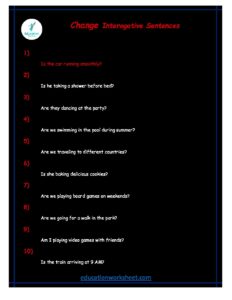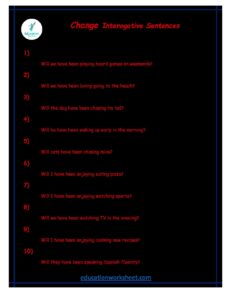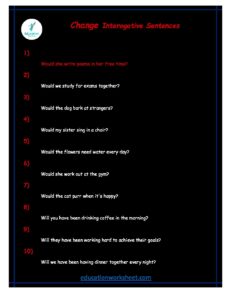Future Continuous Tense interrogative examples
Future Continuous Tense interrogative examples
Structure of Future Continuous Tense: The Future Continuous Tense is formed by using the future auxiliary verb “will” (or its contracted form “will”) along with the base form of the main verb and the present participle “-ing” ending. The structure for interrogative sentences in the Future Continuous Tense is as follows:
[Will/Won’t] + [Subject] + [be] + [main verb + -ing] + [rest of the sentence]
Examples:
- Will you be studying for the exam tomorrow?
- Will they be working late tonight?
- Won’t he be attending the conference next week?
- Will she be cooking dinner when we arrive?
- Will it be raining when you leave for your trip?
- Won’t we be watching the game during the evening?
Detailed Explanation and Usage: The Future Continuous Tense is used to describe actions or events that will be ongoing at a specific time in the future. It emphasizes the duration of the action, and it is often used when you want to show that an action will be in progress before and after another event in the future. Here are some key points to keep in mind:
- Future Time Reference: The Future Continuous Tense is used when you want to discuss actions or events that will happen in the future. It often involves a specific time or a specific event.
- Will she be working at 3 PM tomorrow?
- What will you be doing next Friday evening?
- Duration of an Action: This tense is used to emphasize the ongoing nature or duration of an action that will take place in the future. It answers the question, “What will be happening at that time?”
- I will be studying for the entire evening.
- They will be traveling all day.
- Polite Questions: The Future Continuous Tense is a common choice when you want to make polite inquiries about someone’s plans or activities in the future.
- Will you be attending the event on Saturday?
- Will he be available for a meeting later?
- Predicting Future Actions: It can also be used to make predictions about future actions when you are reasonably certain about them.
- I think they will be celebrating their anniversary next week.
- It looks like she will be practicing the piano in the afternoon.
- Concurrent Actions: This tense is ideal for expressing concurrent actions, where one action is in progress while another event occurs.
- Will they be playing soccer while we have our picnic?
- I will be cooking dinner while you set the table.
- Negative Form: To form a negative sentence in the Future Continuous Tense, simply add “won’t” before the subject.
- She won’t be working on the project tomorrow.
- They won’t be traveling to Europe next summer.
Interrogative Form of Future Continuous Tense:

Interrogative sentences are used to ask questions. In the Future Continuous Tense, you can form interrogative sentences by rearranging the elements as follows:
- Begin with the modal auxiliary verb “will” (or its contracted form “won’t” for negative questions).
- Follow “will” with the subject of the sentence.
- Add “be” after the subject.
- Use the main verb in its present participle form (ending in -ing).
- Complete the sentence with the rest of the question.
Examples of Interrogative Sentences in Future Continuous Tense:

- Will you be attending the conference next month?
- Here, the question is about the person’s action (attending the conference) in the future.
- Will they be watching a movie this evening?
- This question inquires about the future activity of watching a movie.
- Won’t she be working on the project tomorrow?
- This is a negative interrogative sentence, questioning whether she will be working on the project.
- Will it be raining when we arrive at the campsite?
- This question is about the weather condition (raining) at a specific future point in time.
- Will the children be playing in the park at 4 PM?
- This question focuses on the children’s activity (playing in the park) at a specific time in the future.
- Won’t they be driving to the airport for their trip?
- A negative interrogative sentence inquiring about their transportation plans.
Additional Considerations:
- When asking questions in the Future Continuous Tense, remember to place the modal auxiliary verb “will” at the beginning of the sentence.
- The word order is crucial, with the subject coming after the modal auxiliary verb.
- Be sure to use the main verb in its “-ing” form to indicate that the action will be ongoing.
- To form negative questions, use the contracted form “won’t” before the subject.
- In questions, it’s common to use question words like “what,” “where,” “when,” “why,” “who,” or “how” at the beginning of the sentence to gather specific information.
Future Continuous Tense interrogative examples


